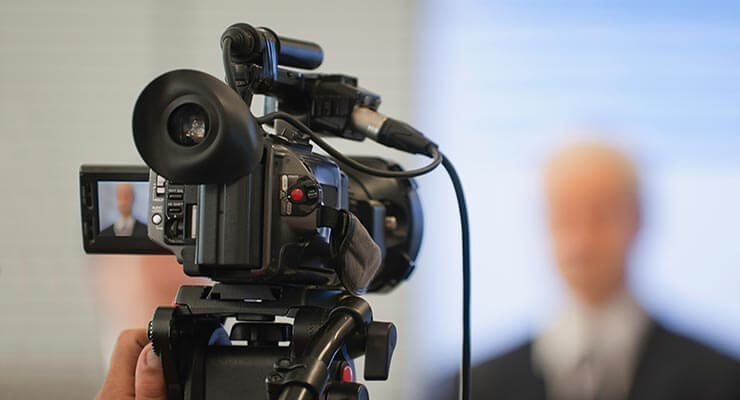Full-Service Legal Videography for Capturing Legal Proceedings.
Full-Service Legal Videography for Capturing Legal Proceedings.
Blog Article
The Role of Legal Videography in Depositions and Tests
Legal videography has actually arised as an important tool in both depositions and tests, supplying a complex strategy to recording witness testaments. As lawful experts progressively acknowledge its worth, it triggers a much deeper exam of how these aesthetic documents can affect juror assumptions and test outcomes.

Importance of Legal Videography
Legal videography plays a critical duty in the paperwork and discussion of depositions and trials. This specialized area combines technical abilities with lawful expertise to create a trustworthy document of process that can significantly influence instance results. The appearance of lawful videography boosts the understanding of witness statement, permitting jurors and courts to observe not only the spoken words but also the temperament, emotions, and body language of the witnesses.
Furthermore, lawful videography provides an unbiased account of occasions, reducing the potential for false impression that can accompany created records alone. This visual documents works as a crucial tool throughout test presentations, promoting a clearer and more persuasive story for both plaintiffs and defendants. Moreover, the ability to replay video clip sections during court proceedings makes it possible for legal groups to highlight essential factors, enhancing their arguments efficiently.
The importance of lawful videography expands past the court; it also plays a vital function in maintaining proof for future reference, whether for allures or additional lawsuit. Thus, its integration right into the lawful procedure is crucial for guaranteeing a reasonable and precise representation of the realities, eventually adding to the search of justice.

Refine of Legal Videography
While catching the subtleties of depositions and tests, the procedure of lawful videography entails numerous crucial actions that make certain high-grade, exact recordings. An expert legal videographer prepares by assessing the instance materials and recognizing the details demands of the deposition or test. This preparation consists of familiarizing themselves with the individuals and the context, which helps in recording essential details.
On the day of the recording, the videographer establishes the needed devices, which usually consists of high-def video cameras, microphones, and appropriate lights. Making sure optimal angles and audio quality is vital, as it directly influences the effectiveness of the recording. The videographer interacts with attorneys and individuals to establish methods, making certain that everyone recognizes the recording procedure.
During the deposition or test, the videographer carefully tape-records the process, paying close focus to both spoken and non-verbal signs. This includes capturing the temperament and responses of witnesses and attorneys. After the session wraps up, the videographer may modify the video footage for clearness and compliance with legal requirements, generating an end product that properly shows the procedures for future referral and use in lawful contexts.
Benefits in Depositions
The unification of videography in depositions offers countless advantages that boost the general procedure of gathering evidence. One main advantage is the ability to record witness statements with visual and auditory fidelity, providing an extra precise representation of the witness's disposition, tone, and body movement. This multidimensional approach permits lawyers and courts to assess reputation better than typical written records alone.
In addition, videographed depositions act as a powerful tool for protecting testimony. Should a witness become inaccessible for trial, their recorded deposition can be played in court, explanation making sure that their proof remains available and appropriate. This aspect considerably reduces the threat of shedding important information that might impact case outcomes.

Lastly, videography enhances the general expertise of the deposition procedure, instilling self-confidence in customers concerning the thoroughness of their legal representation (legal videography). By leveraging innovation, lawyers can substantially improve the efficiency of depositions
Influence On Trials
In several trials, the assimilation of videography can dramatically influence the presentation of proof and the court's understanding. Legal videography catches witness statements and crucial proof in a dynamic format, enabling jurors to involve with the product on numerous levels. This aesthetic element enhances the storytelling aspect of a trial, giving context and psychological resonance that traditional text-based evidence may lack.
Furthermore, video recordings can work as effective devices for impeachment during interrogation. When discrepancies develop between a witness's prior statements and their court testimony, video clip evidence offers an unbiased recommendation that can sway jurors' opinions. This immediacy and quality can strengthen the integrity of a party's narrative while simultaneously undermining opposing arguments.

Future Trends in Legal Videography
As we look toward the future of legal videography, numerous emerging fads promise to reshape its role within the court room. One significant trend is the integration of fabricated intelligence (AI) in video evaluation and editing. AI can simplify the process of determining vital moments in recorded depositions, allowing lawyers to swiftly access appropriate material, thus boosting performance in try here instance prep work.
Furthermore, the surge why not find out more of digital reality (VR) and augmented truth (AR) technologies is anticipated to transform how jurors experience proof. legal videography. By immersing jurors in a substitute atmosphere, these modern technologies can offer a much more profound understanding of intricate scenarios, resulting in even more informed deliberations
Moreover, the enhancing need for remote depositions, sped up by the COVID-19 pandemic, will likely continue. Legal videographers will need to adapt to new software application and platforms to make sure premium recordings in online settings.
Last but not least, the expanding focus on data security will certainly require more stringent protocols for storing and sharing video proof. As the lawful landscape advances, lawful videographers need to stay abreast of these trends to maintain their significance and efficiency in the judicial process.
Verdict
In recap, lawful videography serves a vital feature in the judicial procedure, enhancing the honesty of depositions and trials. As technology proceeds to advance, lawful videography is poised to further change its role within the legal landscape.
Report this page